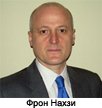Nahzi and Chuck Sudetic. Kosovo’s Original Sin
June 20, 2009 (по-русски)
 PRISTINA – Hundreds of people disappeared ten years ago in Kosovo, the former Serbian province that is now the world’s newest state. These are not missing persons like the Albanians whom Serbian police executed and buried in secret graves during the Kosovo conflict of 1999. These missing persons disappeared after the conflict, on NATO’s and the United Nations’ watch. Most were Serb civilians. Relatives of most report that they were abducted.
PRISTINA – Hundreds of people disappeared ten years ago in Kosovo, the former Serbian province that is now the world’s newest state. These are not missing persons like the Albanians whom Serbian police executed and buried in secret graves during the Kosovo conflict of 1999. These missing persons disappeared after the conflict, on NATO’s and the United Nations’ watch. Most were Serb civilians. Relatives of most report that they were abducted.
 Kosovo, to a significant degree, owes its independence to a NATO military intervention undertaken in the name of human rights. And in the name of human rights, it is time for the truth to come out about the people who went missing after the conflict, and about why, for a decade, UN officials ignored appeals by the victims’ families and launched no criminal investigation.
Kosovo, to a significant degree, owes its independence to a NATO military intervention undertaken in the name of human rights. And in the name of human rights, it is time for the truth to come out about the people who went missing after the conflict, and about why, for a decade, UN officials ignored appeals by the victims’ families and launched no criminal investigation.
Kosovo’s Albanian authorities have for years made no significant decision without receiving the imprimatur of the European Union and, especially, the United States. They should urge the Kosovo government to mount a credible investigation, for the sake of the victims and people in Kosovo who want their state to be ruled by law.
In 1999, the US led NATO into war against Slobodan Milosevic’s Serbia to end gross violations of the rights of Kosovo’s majority Albanians. Serb nationalists had quashed Kosovo’s autonomy. Serb troops beat, killed, and jailed Albanians, whose leaders, following cues from Western embassies, urged nonviolence.
After the rise of an Albanian insurgency, the Kosovo Liberation Army (UCK), Milosevic launched a violent, all-out campaign to expel Kosovo’s Albanians. Villages were burned. Serbian police forces killed Albanian civilians and cast out hundreds of thousands. (The authorities in Belgrade have yet to come clean on the Albanians civilians executed and buried on police and military bases in Serbia.)
NATO forced Serb forces to withdraw in June 1999, and international peacekeepers, under NATO’s leadership, occupied Kosovo. The UN sent a mission to help establish local institutions. The US and West European countries began shepherding Kosovo’s new Albanian authorities toward statehood. Last year, Kosovo gained independence. Sixty countries, including the US and most EU states, have recognized it.
According to a recent BBC news investigation, however, UCK members abducted Serbs, Albanians, Roma, and others after NATO’s arrival. UN missing-persons researchers – not criminal investigators – searched for them for years and found no trace of them in Kosovo. They did, however, find Albanian witnesses who asserted that UCK members took captured Serbs, Albanians, and Roma into Albania, where they were killed.
Now the BBC has broadcast interviews with Albanians who were imprisoned in secret UCK camps in Albania. These witnesses confirmed that the camps also held Serbs, Roma, and others. The BBC located graves of some of the missing in Albania. There have been leaks of UN documents citing Albanian sources who name people involved.
From June 1999, the UN and NATO contingents in Kosovo clearly calculated that stability trumped justice. Despite the urging of staff members, leaders of these missions avoided launching criminal investigations into the missing. Some UCK leaders, lionized by the local Albanian population as the victors of 1999, are now running Kosovo’s government. Their blanket denials are no longer credible.
Kosovo will not convince many more countries to recognize its independence unless it investigates these disappearances and demonstrates a commitment to the rule of law. (Likewise, no one should forget the Albanian dead that Serbia has not returned.) A credible investigation requires full backing from the authorities in Albania and from the newly established EU mission in Kosovo.
On the record, leaders of this mission say that they are interested in investigating. Diplomats speaking off the record, however, tell a different tale, even as some Albanian political leaders, including some former UCK officials, call for an inquiry. The US should use its political clout with Albania and Kosovo to press for a thorough investigation, and for criminal proceedings against anyone who is implicated.
Albanians are outraged at the allegations that UCK members engaged in war crimes and other criminal behavior. Some Albanians claim that these allegations are Serbian propaganda. But there are many Albanians who know differently, and believe that Kosovo is failing to come to terms with the acts of a few rogue fighters. These Albanians fear that, in the absence of the rule of law, Kosovo will become a mafia state.
Kosovo’s Albanians do not want a state tainted by such allegations. They want a state that respects human rights for everyone. And they want answers about the fate of hundreds of people who have been missing for a decade.
Fron Nahzi, Vice President for Programs at the East West Management Institute, has spearheaded conflict resolution initiatives in Balkans for more than 18 years. Chuck Sudetic is co-author of Madame Prosecutor, the memoirs of the UN war crimes prosecutor Carla Del Ponte.




